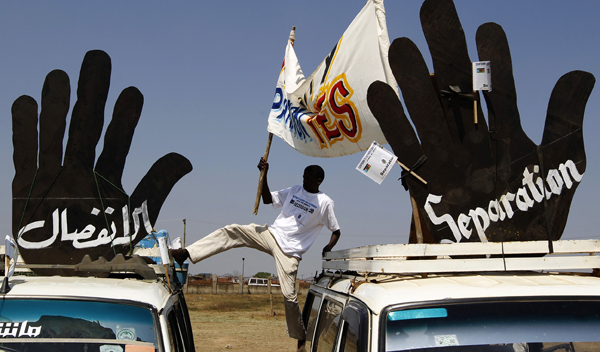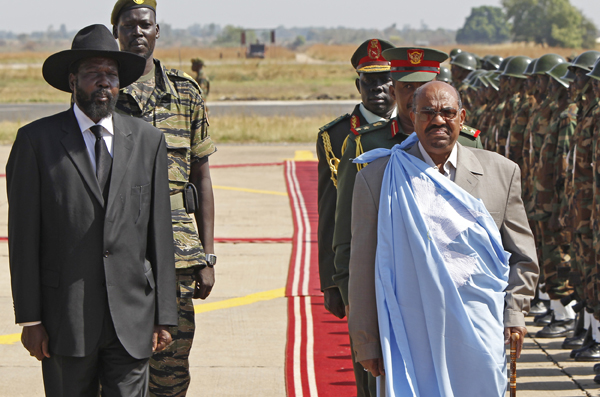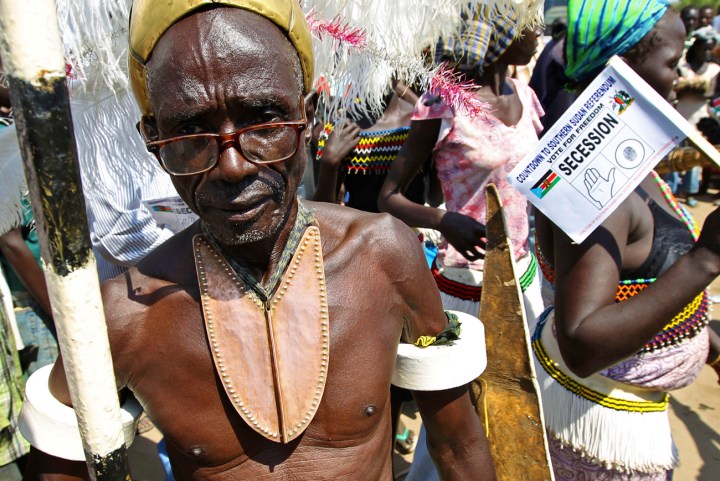The old conventional wisdom about the Sudan has been that the impending plebiscite would generate an angry, smaller rogue state in the north and a development basket case in the south – after more than a half century of devastating conflict between the two halves of the country. Amazingly, an emerging new conventional wisdom is this election may well achieve a peaceful separation – and two less fractious nations. By BROOKS SPECTOR.
Following an extended, and sometimes spluttering, registration process and the major migration south by thousands of voters, southern Sudanese voters begin voting on 9 January on whether to split their impoverished but oil-rich section of the Sudan from the northern part of Africa’s largest nation. This poll, scheduled to take place over a week of voting, is almost certain to lead to the emergence of Africa’s newest nation by July this year, according to analysts and experts.
This potentially peaceful vote is taking place in a nation that has witnessed a half century of warfare between the predominately Muslim-Arab north and the primarily Christian/animist and darker-complexioned ethnicities of the south – as well as years of government-inspired depredations against the country’s western Darfur region, flickering insurgencies in the eastern region and occasional conflicts between modernist, more secular Muslims and their fundamentalist opponents within the Sudanese heartland. In fact, fighting seems to have been the key constant of Sudan since the country’s independence from joint Egyptian-British rule in 1956.
Verdi’s great opera, Aida, ostensibly a love story embedded in the conflict between lighter-skinned Egyptians and darker complexioned Ethiopians, in addition to its glorious marches and splendid arias, could just as easily serve as placeholder for the racial/ethnic/religious fault line that cuts right across Africa – from Sudan and on through Nigeria and the Ivory Coast. The animosities between north and south in the Sudan extend backwards into history to ancestral memories of slave trading and worse for thousands of years.
To think of the Sudan inevitably brings to mind conflict: General Kitchener’s campaign against the Mahdi’s religiously inspired revolt against the Anglo–Egyptian forces at the Battle of Obdurman (courtesy of the Maxim machine gun); Winston Churchill’s journal of that conflict, The River War; or the film, Khartoum. Or perhaps that plangent documentary about Dinka young men who fled Sudan’s conflicts only to come to grips with the confusions of life in the American South. Or, just maybe, one of those luminous coffee table books about the Dinka or Nuer cultures, or even the basketball successes of a man like Manute Bol.

Photo: A supporter of the referendum on southern independence adjusts a banner on top of a car during a rally in Juba January 5, 2011. REUTERS/Goran Tomasevic.
Like just about every other African nation, Sudan is something of a manufactured country – assembled as a result of several different historical events, and then almost cynically merged together at the height of the European “Scramble for Africa”.
Throughout the 19th century, conquest of what became northern Sudan was the imperial dream of the Khedives of Egypt, the Turko–Albanian rulers of a nominally subservient part of the Ottoman Empire and then, later, the near-colony of Britain after the building of the Suez Canal.
Towards the end of the century, Egyptian overlordship was virtually extinguished by the crusading Wahabi Islam of the Mahdi, the spiritual-military leader of a revolt against the outsiders, until combined Egyptian-British forces defeated his religious-populist rebellion. Almost simultaneously, British and French imperialist expansion nearly caused a general European war when their respective expeditionary forces almost came to blows at a flyspeck on the map called Fashoda – until the French retreat left the Sudan ever more firmly in the British sphere of control.
Just a few years earlier, in a movement from the South, as part of efforts to ward off Omani slave-trading raids based in Zanzibar (and incidentally, to wring commercial interests in the area such as huge ivory harvests in the UK’s favour as well), and also to preclude encroaching German and Belgian claims on the southern region that was then named Equatoria, Britain slowly extended its imperial control over the South from new outposts in Uganda. This expansion also played to an imperial dream of a continuous swathe of British territory in Africa from the Cape Province to Cairo. Thus the two very different halves were brought together, essentially as part of an imperial administrative rationalisation, to become the newly proclaimed Anglo-Egyptian Sudan – setting the table for today’s conundrums.
And now, after decades of warfare in the South against the central government, often led by charismatic leader John Garang, and some five years after the Comprehensive Peace Agreement was eventually negotiated under US encouragement, hundreds of thousands of Southerners have been moving southward, registering for Sunday’s poll, contemplating the possibility that they will create a new nation after fighting that claimed about two million victims since 1956. In the referendum, around 95% of Sudanese southerners are expected to vote in the south, with the remainder in the North or scattered around the world in eight or nine nations. The vote will need 60% participation to be declared valid.
That accord originally must have seemed well beyond the realm of the possible, let alone the likely, not least by virtue of rebel leader John Garang’s opposition to it. But, after his death, the separation eventually came to be seen as the logical choice. Or as the almost-certain president of the South, Salva Kiir Mayaridit, said the other day, the vote for separation “is the final part of our journey”.
Remarkably, it appears that even Sudan’s president Omar Hassan al-Bashir too has come to accept the reality that separation will take place. In a speech he gave recently in Juba, al-Bashir told his audience that while he would be “sad” if the country splits, “I am going to celebrate your decision, even if your decision is secession.” While observers say the registration process for the vote has been a bit of a shambles, the voting now seems likely to be carried off peacefully as international groups like the Carter Peace Center in Atlanta and the International Crisis Group share in the observer detail.

Photo: South Sudan’s President Salva Kiir and Sudan’s President Omar Hassan al-Bashir review an honor guard at the airport in Juba January 4, 2011. REUTERS/Goran Tomasevic.
Moreover, in a true Hollywood-meets-the-IT-world-meets-making-the-world-safe-for-democracy-moment, heartthrob actor George Clooney has spearheaded a coalition of NGOs and glitterati to purchase global-imaging satellite time to monitor troop movements or major efforts at voter intimidation. The resulting images will get a very careful look-see by the kind of people who can quickly sort out an army troop carrier from a Coca-Cola delivery van and then the images will be posted on http://www.satsentinel.org, so anyone who wants to can check to make sure everyone plays fair.
Of his initiative, and the role of celebrity as the new, ultimate peacemaker, Clooney says, “We are the anti-genocide paparazzi. We want them to enjoy the level of celebrity attention that I usually get. If you know your actions are going to be covered, you tend to behave much differently than when you operate in a vacuum.” The project has some $750,000 in start-up money from Not On Our Watch, a human rights organisation Clooney founded together with pals like Don Cheadle, Matt Damon, and Brad Pitt – and Clooney is convinced he will have little trouble raising a whole lot more, as needed.
But behind all this kumbaya, “give peace a chance”, there is one crucial political economy fact giving the process a push: the south has lots of oil, while the north has the export infrastructure needed to turn the oil into all those dollars, euros, renminbi and pounds. Or as Zach Vertin, the International Crisis Group’s Sudan specialist, explains, “The oil is largely in the south, and the infrastructure to export it runs through the north. So there is mutual reliance.” This helps clarify why so many internal and international forces – from oil companies to the US, from China to Arab nations – have all now lined up to support the Comprehensive Peace Agreement and the vote it is about to generate. However, Sudan has yet to achieve a firm, binding agreement on how oil revenues, or extraction and transport costs, will be apportioned between the two sides, so there are still lots of ways things can go wrong after the vote.
Watch: Infrastructure a challenge in South Sudan by Al Jazeera.
And it may not be quite as easy as it sounds to draw Sudan’s new line in the sand crisply, either. When it is finally demarcated, it will be the longest land border between two nations in Africa. Moreover, this division is rather more problematic that it looks. Colour is not the final arbiter of ethnicity in Sudan – there are dark, Arab, Muslim northerners too, and some southern tribes have historically thrown in their lot with the Arab north. Many southerners live in Khartoum and Juba is something of an Arab-speaking city, despite its place in the south. And while the area around the city of the Abyei has apparently shifted towards affiliation with the south – a determination the northern half clearly still objects to – a separate agreement on voting in that region has already come to naught. Of the tensions in Abyei, Claire McEvoy, the Sudan specialist at the Small Arms Survey, says, “Anything could happen.”
Besides Abyei, other areas and issues remain in dispute. As well as sorting out all the problems over the extraction and export of oil, these include how to split the country’s $35 billion in foreign debt (assuming it isn’t all written off as part of the general settlement); how to divide up the national army and its material resources; how to divide rights to the waters of the White Nile; as well as near-biblical quarrels over grazing and land-use rights. But, ultimately, oil is the key for this one. International advocacy group Global Witness insists the two sides must work out a more transparent deal to replace the current one if the whole process is to work out. Global Witness’ recent report on Sudanese oil argues:
Under the current circumstances Sudanese citizens cannot be sure how much oil their country produces and therefore cannot be sure that the oil wealth-sharing agreement is being implemented fairly. It is critical that these issues are addressed. A new oil deal between north and south is essential to prevent a return to full-scale war.
Nonetheless, things have reached this surprisingly positive stance primarily through diplomatic means, not helicopter gunships. Months ago, US senator John Kerry promised Sudanese President Omar al-Bashir that if the north supported a peaceful accomplishment of the referendum, the US would remove Sudan from its list of state sponsors of terrorism, potentially opening up new trade and investment possibilities. And progress on Darfur, meanwhile, could lead to the end of economic sanctions and relief of Sudan’s $35 billion worth of foreign debt. As senator Kerry said, “All sides are really focused on trying to avoid more conflict.”
Meanwhile, former South African president Thabo Mbeki, on behalf of the African Union, has been a lead negotiator between the two parts of the country, and Qatar and even China have pitched in to nudge the protagonists into peaceful proximity of each other. The US special envoy to the country, Scott Gration, commenting on the process, explained, “We did not come together by accident. We have the same mission: creating an environment where the parties themselves pull this off.”
On Wednesday, Mbeki praised Sudanese president al-Bashir in a speech he gave at the University of Khartoum. In describing al-Bashir, a leader, after all, who has been indicted by the International Criminal Court (ICC) for war crimes in Darfur, for his acceptance of the secession referendum, Mbeki said:
There is no greater test of statesmanship than to accept, in a graceful, generous and humane manner, the decision of those of your people who have the opportunity to choose secession.
We are very mindful of the sacrifices the political leaders of Sudan have to make, even in terms of their personal lives, to play their roles as change agents for the creation of a new reality which portends a future of hope, happiness and a better life for all the people of Sudan.
That sounds a whole lot better than being labelled a war criminal over Darfur – one of al-Bashir’s earlier experiences. Two years ago, the ICC had charged Bashir with crimes against humanity in his treatment of the Darfuris when government troops and irregular militias tried to crush rebel groups. The janjaweed militia engaged in widespread killings of civilians and the UN now says some 2.7 million people were displaced as a result of the violence and wholesale destruction.
And even a peaceful, successful secession by the south could generate political instability in the north, along with new pressures for separation by people in Darfur. Meanwhile, in the south, leaders of several guerrilla groups may yet try to put a spoke in the wheel of the final settlement. The infrastructure deficit in the south is so big that an enormous number of hopes for prosperity will remain dependent on luck, long-time effort and a huge gaggle of foreign consultants and hires-on (and the economic and social distortions and disruptions that will no doubt cause).
David Gressly, the UN’s coordinator in Juba, admits, “Real success will take 20 to 25 years.” And so, even if this coming vote is peaceful and predictable, will everyone in Juba or the bush, or in Khartoum for that matter, really be prepared to wait a generation for oil’s largess to solve the two nation’s problems?
Meanwhile, time to get ready for the vote counting and those pictures of South Sudanese voters lining up across the landscape, profiled against the Sun, to cast their votes about their future. And, of course, the kerfuffle over what the new flag looks like, the national anthem – and even the official name of the country. That stuff matters too. DM
Read more on the current situation: Time, the BBC, the BBC, the BBC, Polity, Creamermedia newsletters, CNN, CNN, the New York Times, the New York Times, the New York Times, the New York Times, the New York Times, the Economist, the Washington Post, and the Centre for Strategic and International Studies blog.
For more on George Clooney’s satellite intervention, read Time and ABC News.
For background on the US Government role in the Sudan peace accord, read State Department, State Department and State Department documents.


















 Become an Insider
Become an Insider